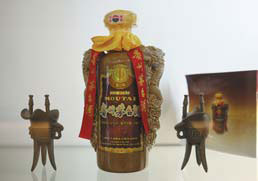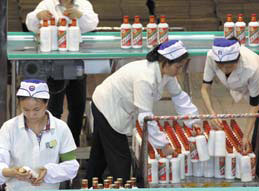Spirit of giving also means getting
Distiller looking to protect the environment and help the local community as it prospers, Riazat Butt reports.
The distance between Guiyang, Guizhou's provincial capital, and Maotai, home to China's best-known liquor, is approximately 180 kilometers. Traffic jams and overturned trucks can make it feel a lot longer than that, while an overcast and drizzly March afternoon conspire to hide the region's famed natural beauty, reducing both driving speeds and visibility between the two locations.
China's road to corporate social responsibility can be likened to this journey. There are no shortcuts and there are often delays, but it is possible to reach one's destination.
"Enterprises are not sure what effect CSR will have and there is no data to support it. They pay more attention to economic development and may ignore the environmental aspects," says Wang Zhongping, director of the Horizon Corporate Volunteer Consultancy, which helps firms with corporate volunteering programs. This uncertainty is partly due to the immaturity of CSR in China, which lags several decades behind Western CSR, but the country's values lend themselves to corporate giving, he explains.
"China has a long history of charitable culture, influenced by Confucianism. Many enterprises begin to contribute to the community as they develop and mature," he says.
At the headquarters of the Kweichow Moutai Co Ltd, executives emphasize their sense of commitment and duty toward the public.
"Big brands should shoulder a bigger responsibility," the company's chairman Yuan Renguo informs visitors gathered in the 10th floor boardroom.
The company is spending hundreds of millions of yuan on improving the surrounding infrastructure. An airport, a bridge and expressway are in the offing. There is also lots of enthusiasm for protecting the Chishui River, which separates Guizhou, one of the poorest provinces in China, from its bigger, richer and more famous neighbor, Sichuan province, and whose water is a key ingredient in the making of the spirit.
"We need to strike a good balance between economic development and environmental protection," says the Chairman Yuan Renguo. To this end the company, which had a turnover of 40.8 billion yuan ($6.57 billion) and made a net profit of 22.3 billion yuan in 2014, is setting aside 50 million yuan every year for 10 years to preserve the purity of the Chishui River Basin.
Protecting the river guarantees the water supply to homes, businesses and farmers, including those who grow sorghum, the crop at the heart of the fiery liquor. In addition, Kweichow Moutai requires 60 metric tons of water to make one ton of liquor and its factories and workshops use about 315,000 tons of water a month. While better infrastructure, such as the new Renhuai-Maotai Airport and expressway, will not only help the company's supply and distribution network, they will also attract investment and tourists.
Kweichow, which has also donated cash to disaster-affected areas and needy students, sees this approach as a circular economy, whereby it is not only the community that benefits from its initiatives.
The firm's sense of social responsibility meets public expectations, it fulfills the company's desire to give something back and it also helps the bottom line.
The company's interpretation of CSR is similar to the model adopted by US coffee giant Starbucks, says Sam Lee, the CEO of InnoCSR, which helps companies across Asia with their CSR programs. The famous Seattle-based beverage firm opened a coffee bean farm in Yunnan, where it also established a coffee development center, coffee farmer support center and coffee processing facilities. These initiatives, from one of the best-known brands in the world, provide income and employment for people in the area.
"Corporate philanthropy is important but it is only part of CSR. There is a huge disparity between the rich and the poor in China and corporate philanthropy addresses that," says Lee.
"But it falls into a trap of meaningless philanthropy, where you donate money to causes that have nothing to do with your business or the government is making you do it."
Starbucks and the snack manufacturer Lay's, which built a potato chip factory in Inner Mongolia autonomous region, have been strategic with their CSR by committing to the local population through employment, technology and education. "You should have a business model that is win-win for stakeholders," says Lee. "If Chinese companies go global, they need to be more aware of CSR. The government knows this and wants to change that perception of 'Made in China'."
Peter Hofman, associate professor in corporate governance and corporate social responsibility at Nottingham University Business School China, says Chinese companies will follow different CSR models according to their markets. "For companies in China it's about being legitimate in China. If you have to operate worldwide you have to be worldwide. CSR in China is a work in progress, it is going to evolve and there are Chinese organizations actively working on it."
"Social contributions play a key role in the competition of modern enterprises," says Yang Yan, who works in Moutai's administration department.
"The construction of a circular economy aims to make the product and gain profits while protecting the environment, conserving resources and reducing pollution."
Contact the writer at riazat@chinadaily.com.cn
|
A vintage Moutai. Wang Zhuangfei / for China Daily |
|
Workers check for product quality at a Moutai factory. Zhang Wei / for China Daily |
(China Daily 05/08/2015 page7)
















